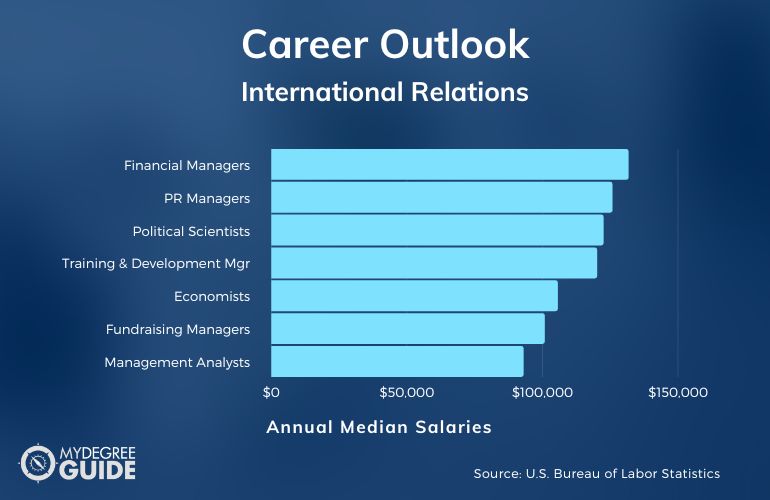If you have dreams of working on a global stage, then you might consider getting a masters in international relations.

In this program, you can gain knowledge and expertise that can help prepare you for careers in international business, government affairs, nonprofit work, or foreign policy development. A master in international relations could be a valuable addition to your resume and set you up for a variety of global roles.
Editorial Listing ShortCode:
If you’re interested in exploring world governments, conflicts, and diplomatic relationships, then you might want to take a look at this intriguing graduate program.
Best International Relations Graduate Programs
Methodology: The following school list is in alphabetical order. To be included, a college or university must be regionally accredited and offer degree programs online or in a hybrid format.
American Public University
American Public University’s Master of Arts in International Relations and Global Security is available online. Students must choose one of four concentrations: International and Transnational Security Issues, Peacekeeping, Conflict Resolution, or Comparative and Security Issues. Classes start monthly, and each one is 8 or 16 weeks long.
APUS is accredited by the Higher Learning Commission.
American University
American University offers an online program for a Master of Arts in International Relations. The program requires the completion of 39 credit hours, one weekend immersion experience, and a capstone project. Students in the program take live classes via webcam and participate in discussions and collaborative exercises. The curriculum emphasizes both theory and practice.
American University is accredited by the Middle States Commission on Higher Education.
Arizona State University
Arizona State University offers an online program for a Master of Arts in International Affairs and Leadership. The program consists of 10 required classes for a total of 30 credit hours. Each class is 7.5 weeks long. The program also requires two weeklong, in-person experiences in Washington, DC, to gain hands-on experience.
Arizona State University is accredited by the Higher Learning Commission.
Harvard University
Harvard University’s extension school offers a Master’s in International Relations that can be earned online. Most students in the program work full-time and take just one or two courses each semester. Students may use their elective choices to earn a stackable certificate in international security, social justice, or nuclear deterrence.
Harvard University is accredited by the New England Commission of Higher Education.
Liberty University
Liberty University offers a 36 credit, online program for a Master of Science in International Relations. Each class is 8 weeks long, and students can typically graduate in 1.5 years. Liberty is a Christian school that focuses on helping students develop leadership skills so they can make an impact on the world.
Liberty University is accredited by the Southern Association of Colleges and Schools Commission on Colleges.
Norwich University
Norwich University offers a 100% online program for a Master of Arts in International Relations that usually takes about 18 months to finish. Students may choose a concentration in Cyber Diplomacy, National Security, International Security, Regions of the World, or International Development. Norwich caps class sizes at 15 students.
Norwich University is accredited by the New England Commission of Higher Education.
Regent University
Regent University offers a Master of Arts in Government—International Relations that can be earned on campus or online. The program requires the completion of 33 credit hours. The curriculum consists of courses such as International Relations and Cyber Politics, Christian Ethics and the Law of Armed Conflict, and Mid-East Politics.
Regent University is accredited by the Southern Association of Colleges and Schools Commission on Colleges.
St. Mary’s University – San Antonio
At St. Mary’s University—San Antonio, the Master of Arts in International Relations can be completed online, on campus, or in a combination of both. There are two concentrations to choose from: Security Policy or Sustainable Development and Conflict Transformation. Internship opportunities are available in the United States and abroad.
St. Mary’s University is accredited by the Southern Association of Colleges and Schools Commission on Colleges.
Troy University
Troy University offers an MS in International Relations with concentrations in Global Studies, National Security Affairs, and Regional Affairs. All concentrations require the completion of 36 credit hours and are available 100% online. Troy’s online classes are each 9 weeks long, and there are five start dates throughout the year.
Troy University is accredited by the Southern Association of Colleges and Schools Commission on Colleges.
Webster University
Webster University offers a flexible program for a Master’s in International Relations that has full-time and part-time scheduling options. Students may study abroad and have the opportunity to earn a dual MBA. Webster offers classes online and at multiple campus locations, in a traditional semester format, and in 8 or 9 week blocks.
Webster University is accredited by the Higher Learning Commission.
Online Masters in International Relations Programs

The world has become increasingly connected. Experts who understand how to navigate global matters and improve international relationships are much needed. You can develop those valuable skills through international relations masters degrees.
You might be a good fit for this degree path if you have a keen mind for analysis, are interested in events around the globe, and have a passion for solving problems. This degree could be useful for jobs in the United States or anywhere in the world.
Your studies might cover:
- Comparative politics
- Conflict resolution
- Diplomacy
- Economics
- Leadership practices
- Risk management
- Security principles
- Social responsibility
There might also be classes that teach you about research methods in the social sciences. International relations programs often give students experiences that reflect situations they might face in the real world. That can include case studies or diplomacy simulations.
Your program might include a thesis, which would be a research and writing project that you’d undertake toward the end of your program. If not, there could be an internship or a different type of capstone project. Many colleges offer international relations programs with concentrations.
You might choose to specialize in international security, policy analysis, conflict resolution, or human rights. You could also focus your studies on a particular region of the globe. This type of degree program is often available in an online format. You could earn your masters degree by taking distance classes and using virtual platforms to collaborate with classmates. The lectures might be prerecorded or held live.
With a master’s degree in international relations, you could find work in a business, government, or research capacity. Humanitarian organizations, policymaking groups, and the military may also hire people with expertise in this field.
Potential job titles connected to this area of study include:
- Political scientist
- Management analyst
- Policy analyst
- Nonprofit director
You might also find applications for this degree program in a journalism, teaching, or law career.
International Relations Careers & Salaries

Professionals with a degree in international relations could work for a government agency or an NGO. Other potential employers include businesses that operate internationally, nonprofit organizations, or the military. With this degree, you might even be able to pursue a position in the United Nations! Within such organizations, there are many different job opportunities.
For example, some professionals work as a manager or director of an NGO, a nonprofit, or a government agency. These types of positions may be available at home or abroad. Perhaps you’d like to work as a global economist, or you might have a political science career in mind. Some political scientists are researchers. Others work as policy analysts.
That’s not the only analyst role for which you might be suited. For example, some graduates work as management analysts or consultants for global businesses. With the right background, you may be qualified as a security analyst. According to the Bureau of Labor Statistics, here is a range of career paths related to the field of international relations.
| Careers | Annual Median Salaries |
| Financial Managers | $131,710 |
| Public Relations Managers | $125,780 |
| Political Scientists | $122,510 |
| Training and Development Managers | $120,130 |
| Economists | $105,630 |
| Fundraising Managers | $100,810 |
| Management Analysts | $93,000 |
| Operations Research Analysts | $82,360 |
| Social and Community Service Managers | $74,000 |
| News Analysts, Reporters, and Journalists | $48,370 |
International business studies could lead to a variety of interesting careers, but it’s strategic to have a goal in mind before beginning your program.
If you have a strong understanding of finance, you might pursue a job as a financial manager. Risk management is a branch of finance that’s especially relevant to international affairs. There could be a classroom career in your future too. Some colleges may hire professionals to teach political science or international relations. Your academic options may be broader if you earn a PhD as well.
With state teaching licensure, this degree could be useful for high school teachers. You could teach classes like government and civics. A masters degree in international relations could also pair well with an established law career. Adding this degree could help you expand into international law. Finally, journalism is a career to consider, as some journalists specialize in international topics.
Master of International Relations Curriculum & Courses

As a student in an international relations program, you’ll take classes that prepare you for working in international settings and with cross-cultural teams.
Your program might include courses similar to the following:
- Comparative Politics: You’ll look at political systems from around the world, compare and contrast the approaches, and consider how governmental structures affect diplomatic strategies.
- Consulting: You might learn how to work as a consultant in global settings—analyzing organizational practices and presenting ideas for improvement.
- Diplomacy: As you discuss foreign policy and relations, you’ll also learn about departments and organizations that play a role in setting policies and building international relationships.
- Global Economics: You’ll discuss factors that influence economic trends—both growth and recession—around the world.
- Globalization: This class will focus on the interconnectedness of nations and how those relationships influence economics, politics, and more.
- International Human Rights: You can study the importance of basic rights for all people and take a look at ways to promote fairness and equality for everyone.
- Population Health: This course will address health equity, health policy, and access to healthcare services for communities around the world.
- Social Science Research: You’ll learn how political scientists and their colleagues conduct research and share their findings.
- Sustainability and Social Responsibility: Your time in this course might focus on the ways that international businesses can contribute to the global good through responsible, ethical operations.
- World Conflict: This course might cover war and terrorism as well as approaches to conflict resolution.
Your program might include case study analyses, an internship, a major research paper, or a capstone project.
MA in International Relations Admissions Requirements

Just as with an online international business degree program. it’s beneficial to pay attention to the admission requirements for online international relations masters programs. They can vary from school to school, so it’s necessary to put together a unique application packet for each college on your list.
Common requirements include:
- GRE or GMAT score (only required at some colleges)
- Professional references
- Resume
- Transcripts from your bachelor’s degree and any other college programs
- Writing sample or personal statement
Having a minimum college GPA of 3.0, on average, is another common requirement for many masters programs.
Masters Programs in International Relations Accreditation

Regional accreditation is an important factor to consider when selecting a college for your graduate studies. Regionally accredited schools have proven their adherence to set standards, and they’ve demonstrated that they have reputable practices and educate students well.
Accreditation can boost your confidence that you’re investing your time and money wisely. Attending an accredited school is also a requirement for receiving federal financial aid. In addition, other institutions and employers typically appreciate the quality assurance that regional accreditation provides.
When it comes to your academic pursuits, accreditation is often essential for transferring between schools or applying to PhD programs.
Financial Aid and Scholarships

As you’re getting ready to go back to school, it’s helpful to make your financial aid search a priority. Financial assistance can turn the idea of grad school into a reality.
You can start by submitting the Free Application for Federal Student Aid (FAFSA). You may find out that you’re eligible for state and federal loans. It’s possible that there may be a grant program from which you can receive funding too.
Many colleges offer scholarship programs for some of their grad students. You might be able to pair an institutional scholarship with additional scholarships or fellowships from outside organizations. Sometimes, employers help their team members finance graduate studies. Workplace funding could be an essential part of your financial aid package.
What Can You Do with a Masters in International Relations?

Some professionals with masters degrees in international relations become policy analysts or political scientists. According to the Bureau of Labor Statistics, the federal government is the biggest employer of political scientists. There may also be business or banking roles available to those with a background in international relations.
They might deal with risk management, regulatory compliance, or social responsibility. Perhaps they’d work for an American company overseas or in the US office of a foreign-owned company. Graduates might also consider working as a journalist who covers international affairs.
Other still choose to continue their educations in a doctorate program, such as an online PhD in Global Leadership, for example.
How Long Does It Take to Get a Master’s Degree in International Relations Online?

You can generally complete an online international relations graduate program in 2 years or less. Online programs are often designed to have a quicker completion time than on-campus programs. Contributing features include year-round classes and shorter course terms that are usually about 8 weeks each.
Your program’s requirements will also influence how long it takes you to graduate. The fewer credit hours you need, the shorter the studies may be. Also, non-thesis programs may take less time than those requiring a major research project. For example, a 36 credit hour program with no thesis could potentially be completed in 1 year with full-time online studies.
What’s the Difference Between International Studies vs. International Relations Master’s Programs?
Graduate-level training in international studies and international relations can both lead to careers with a global focus.
| International Studies | International Relations |
|
|
Together, these two disciplines make up the field of international affairs.
What’s the Difference Between a Political Science vs. International Relations Master’s Degree?
If you’re interested in world affairs, you could choose to study political science or international relations.
| Political Science | International Relations |
|
|
A political science job could stem from either degree.
Is a Masters in International Relations Worth It?

Yes, a masters in international relations is worth it for many students. In this field, you could influence major decisions, work toward world peace, or help others learn more about things that happen on the other side of the globe.
According to the Bureau of Labor Statistics, employment for political scientists is expected to increase by 6% over the next decade. That’s on par with the average across all job sectors. Analysis and critical thinking are key skills cultivated in international relations programs. No matter what job path you end up on after graduation, those versatile skills can be beneficial in a wide range of industries.
Getting Your Master Degree in International Relations Online

As an expert in international relations, you may have opportunities to influence business decisions, policy choices, and humanitarian efforts around the globe. This important field could offer opportunities to enact meaningful change in the world.
If you’re ready to take on an international relations graduate program, you might consider attending online school for business degree. That could be a convenient way to fit coursework into your busy life.
Today’s online courses are effective and innovative. When you choose an accredited school, you can count on getting a quality education with the potential to advance your career in international relations.
